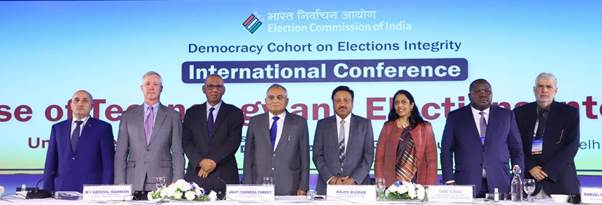24 JAN ,Delhi: Election Commissioner Shri Anup Chandra Pandey today presided over the concluding ceremony of the two-day international conference on ‘Use of Technology’ and ‘Election Integrity’ organized by the Election Commission of India. This was the 2nd such Conference being hosted by the Election Commission of India under the aegis of the Cohort on ‘Elections Integrity’, which was established under the Summit for Democracy – Year of Action Programme.In his address at the concluding ceremony, EC Shri Anup Chandra Pandey highlighted the positive role played by the technology in the election process. “With the introduction of technology, complex electoral management processes can be made simpler and easier to organize. Advances in technology can thus speed processes up and reduce the workload involved in election management. In many countries today, technology is seen by the electoral management body (EMB) also as a means of minimizing the potential for errors, and not just a tool for problem solving”, the EC said.Shri Pandey emphasized that technology had opened a new front in the battle to protect and support democratic institutions and the electoral process. He however said that the cyber-attacks and information influence operations are posing an increasing threat to election infrastructure and perceptions of electoral integrity. The EC added that the Election Management Bodies (EMBs) are required to navigate between the greater and easier citizen participation that accrues due to greater use of technology in elections and the integrity threat trying to erode public trust.Shri Pandey said that electorate confidence and stakeholder trust is necessary for technology absorption in the electoral processes. The EC underscored the need for EMB to come together through sharing of knowledge, experience and technology transfer to fulfil unfinished tasks. We need to address the challenges through knowledge sharing on a regular basis in a structured manner, Shri Pandey added.During the last two days, detailed deliberations spread across three sessions were held. In the first session yesterday on ‘Technology for Election Administration’ the participants highlighted both the benefits and the challenges in use of technology for election administration. It was highlighted that the persistent issue in employing technology is lack of resources; social media is another such double edged sword with equal amount of pros and cons. The need to combat misinformation, fake content and verification of reliable resources also figured in the presentations from EMBs of Armenia, Australia, Croatia & Georgia.In the second session yesterday on ‘Technology Solutions for Inclusive Elections’, presentations were made by International IDEA and EMBs from Angola and Philippines. It was highlighted that EMBs should strive to incorporate technology in an inclusive manner, aware of built-in biases. The presentations also emphasized the need to make information guides to technology applications available in minority and indigenous languages for greater participation.The third session today on ‘Technology as an Enabler & Challenges of Digital Space’ was co-chaired by Dy Chairperson & CEC of Georgia and Vice-President/Minister, Tribunal Superior de Justicia Electoral, Paraguay. The session had presentations from Indonesia & IFES. Mr Matt Bailey from IFES focused on hybrid disinformation/ surveillance/cybersecurity threats to elections, how they will evolve in the near future, and how EMBs can prepare. Ms. Betty Epsilon Idroos, Commissioner, KPU of Indonesia gave a roadmap of Election Digitisation including Digital Transformation Acceleration in the country for the upcoming 2024 election.
Home Government Elector confidence and stakeholder trust, necessary for technology absorption in electoral processes:...


